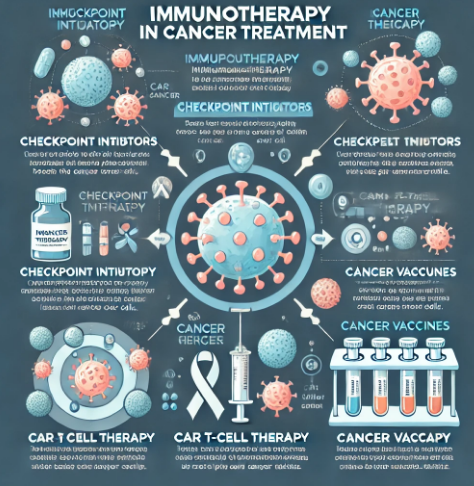Introduction
Immunotherapy has emerged as one of the most groundbreaking advancements in cancer treatment. This innovative approach uses the body’s immune system to fight cancer cells, offering a new option for patients who may not respond to traditional therapies like chemotherapy or radiation. In this article, we will explore how immunotherapy works, the different types of immunotherapies available, the cancers it treats, and the potential side effects and challenges of this evolving field.
How Immunotherapy Works
The immune system is designed to identify and destroy abnormal cells, but cancer cells have developed ways to evade detection. Immunotherapy works by boosting or restoring the immune system’s natural ability to fight cancer. It can target cancer cells directly or enhance the immune response in a more general manner. Some immunotherapies mark cancer cells so the immune system can recognize and attack them, while others unleash a more robust immune response.
Types of Immunotherapy
There are several types of immunotherapy, each with a different mechanism of action:
- Checkpoint Inhibitors: These drugs block proteins like PD-1 and CTLA-4 that prevent immune cells from attacking cancer. By inhibiting these checkpoints, drugs such as Pembrolizumab (Keytruda) and Nivolumab (Opdivo) help the immune system recognize and attack cancer cells.
- CAR T-Cell Therapy: This involves modifying a patient’s T-cells (a type of white blood cell) to express receptors known as chimeric antigen receptors (CARs) that specifically target cancer cells. CAR T-cell therapy has shown remarkable success in blood cancers like leukemia and lymphoma.
- Cancer Vaccines: These are designed to stimulate the immune system to attack cancer cells. An example is the Provenge vaccine used to treat prostate cancer.
- Monoclonal Antibodies: These are lab-made proteins that can bind to specific targets on cancer cells, marking them for destruction by the immune system. Trastuzumab (Herceptin), used in breast cancer, is a well-known example.
Cancers Treated by Immunotherapy
Immunotherapy has shown promise in treating a wide variety of cancers. Some of the cancers most effectively treated with immunotherapy include:
- Melanoma: Checkpoint inhibitors have revolutionized the treatment of advanced melanoma, improving survival rates significantly.
- Lung Cancer: Drugs like Atezolizumab (Tecentriq) have shown success in treating non-small cell lung cancer by enhancing the immune system’s ability to recognize and attack cancer cells.
- Lymphoma and Leukemia: CAR T-cell therapy has been particularly effective in treating blood cancers such as B-cell lymphoma and acute lymphoblastic leukemia.
Benefits of Immunotherapy
- Fewer Side Effects Compared to Chemotherapy: Immunotherapy is often associated with fewer side effects than traditional chemotherapy because it targets only cancer cells, leaving healthy cells largely unharmed.
- Durable Responses: In some cancers, immunotherapy has led to long-term remission, even in cases where other treatments have failed.
- Potential to Treat a Wide Range of Cancers: As research expands, immunotherapy is being tested and used in various types of cancers, offering hope to patients with previously untreatable conditions.
Challenges and Side Effects of Immunotherapy
Despite its promise, immunotherapy is not without challenges:
- Immune-Related Side Effects: While immunotherapy generally causes fewer side effects than chemotherapy, it can still result in immune-related adverse events, such as inflammation in the lungs, liver, or other organs.
- Not Effective for All Patients: Immunotherapy does not work for everyone, and researchers are still working to identify which patients will benefit the most from these treatments.
- High Costs: Immunotherapy treatments are expensive, often requiring specialized care and monitoring, which can be a barrier for many patients.
Recent Advances in Immunotherapy
Immunotherapy is a rapidly evolving field, with ongoing research aimed at improving its efficacy and broadening its application. Some of the most exciting advancements include the development of personalized cancer vaccines, which are tailored to a patient’s specific cancer cells, and combinations of immunotherapy with traditional treatments, such as chemotherapy and radiation, to enhance their effectiveness.
Future Directions
The future of immunotherapy is incredibly promising. Researchers are working on identifying biomarkers to predict which patients will respond best to immunotherapy, and new drugs are being developed to target different aspects of the immune system. The continued integration of immunotherapy into cancer treatment regimens will likely lead to even more success in the fight against this disease.
Conclusion
Immunotherapy has transformed the landscape of cancer treatment, offering new hope to patients with various types of cancers. While challenges remain, including immune-related side effects and the high cost of treatment, the benefits of this approach are undeniable. As research continues to advance, immunotherapy is set to play an increasingly vital role in modern oncology.
References:
- Mellman, I., Coukos, G., & Dranoff, G. (2011). Cancer immunotherapy comes of age. Nature.
- Ribas, A., & Wolchok, J. D. (2018). Cancer immunotherapy using checkpoint blockade. Science.

